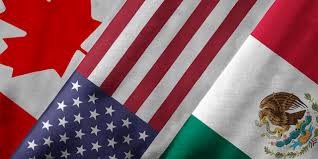The new name for the now defunct Nafta deal is the US-Mexico-Canada Agreement (USMCA) which now could smooth the trade between the three North American companies, encourage businesses in these countries and send out positive signals to investors, according to experts.
The bill is now set to be passed by the US legislators – after House Democrats agreed on Tuesday to back the deal.
Michelle Casario, an associate professor at Villanova University said that the new agreement is flawed but still "a big win".
"It helps [President] Trump and the Republicans, [House Speaker Nancy] Pelosi and the Democrats, and businesses and investors by removing a source of uncertainty in trade policy with our two most important trade partners," Casario said.
Analysts believe that the new trade agreement will help in promoting peaceful trade relations between the three countries.
While the Nafta agreement could have been exited by any of the three countries at point in time, the new USMCA will keep them together for at least the next 16 years. That means that even if US president Donald Trump, who had threatened to pull out of the Nafta if it was now renegotiated, is re-elected he will not have the power to take the US out of the agreement. This will also be applicable to other future administrations for 16 years at least. It also will set up an independent panel for redress of trade related disputes between the countries.
It is also expected to bring in changes in the rules governing the car industry.
Stricter "rules of origin" for cars made and sold in the US, Mexico and Canada would be implemented under the USMCA. That will also include the rule that car makers would have to use at least 75 per cent of auto parts that are manufactured in one of the three countries which will allow auto makers to avail zero expert taxes within the three member trading block. UN the Nafta, that number was 62.5 per cent.
The new agreement also mandates that more than 40% of auto content will have to be made using labour from the three countries with a minimum wage of $16 an hour. That number is almost three times more than the hourly average pay in 2018 for Mexican workers.
However analysts say that there can be some increase in prices because of the higher wages under the new agreement is the auto makers decide to pass on the additional costs to the customers. But Casario said that "the alternative — a U.S. withdrawal from NAFTA/USMCA — would be so much worse."
The USMCA preserves the interests of American farmers as the Mexico and Canada are among the two top export markets for US agri products. Last year the export was worth almost $40 which supported about 325,000 jobs in the sector in the US. Under the new trade agreement, greater access to Canada's dairy markets will now be available to American cattle raisers.
The pact is also expected to strengthen labor and environmental standards. "Working people are responsible for a deal that is a vast improvement over both the original NAFTA and the flawed proposal brought forward in 2017," AFL-CIO President Richard Trumka said in a statement, referring to President Trump's version of the deal he brought to Congress for approval.
Analysts said that the pact is also likely to set digital trade rules.
(Source:www.cbsnews.com)
The bill is now set to be passed by the US legislators – after House Democrats agreed on Tuesday to back the deal.
Michelle Casario, an associate professor at Villanova University said that the new agreement is flawed but still "a big win".
"It helps [President] Trump and the Republicans, [House Speaker Nancy] Pelosi and the Democrats, and businesses and investors by removing a source of uncertainty in trade policy with our two most important trade partners," Casario said.
Analysts believe that the new trade agreement will help in promoting peaceful trade relations between the three countries.
While the Nafta agreement could have been exited by any of the three countries at point in time, the new USMCA will keep them together for at least the next 16 years. That means that even if US president Donald Trump, who had threatened to pull out of the Nafta if it was now renegotiated, is re-elected he will not have the power to take the US out of the agreement. This will also be applicable to other future administrations for 16 years at least. It also will set up an independent panel for redress of trade related disputes between the countries.
It is also expected to bring in changes in the rules governing the car industry.
Stricter "rules of origin" for cars made and sold in the US, Mexico and Canada would be implemented under the USMCA. That will also include the rule that car makers would have to use at least 75 per cent of auto parts that are manufactured in one of the three countries which will allow auto makers to avail zero expert taxes within the three member trading block. UN the Nafta, that number was 62.5 per cent.
The new agreement also mandates that more than 40% of auto content will have to be made using labour from the three countries with a minimum wage of $16 an hour. That number is almost three times more than the hourly average pay in 2018 for Mexican workers.
However analysts say that there can be some increase in prices because of the higher wages under the new agreement is the auto makers decide to pass on the additional costs to the customers. But Casario said that "the alternative — a U.S. withdrawal from NAFTA/USMCA — would be so much worse."
The USMCA preserves the interests of American farmers as the Mexico and Canada are among the two top export markets for US agri products. Last year the export was worth almost $40 which supported about 325,000 jobs in the sector in the US. Under the new trade agreement, greater access to Canada's dairy markets will now be available to American cattle raisers.
The pact is also expected to strengthen labor and environmental standards. "Working people are responsible for a deal that is a vast improvement over both the original NAFTA and the flawed proposal brought forward in 2017," AFL-CIO President Richard Trumka said in a statement, referring to President Trump's version of the deal he brought to Congress for approval.
Analysts said that the pact is also likely to set digital trade rules.
(Source:www.cbsnews.com)






